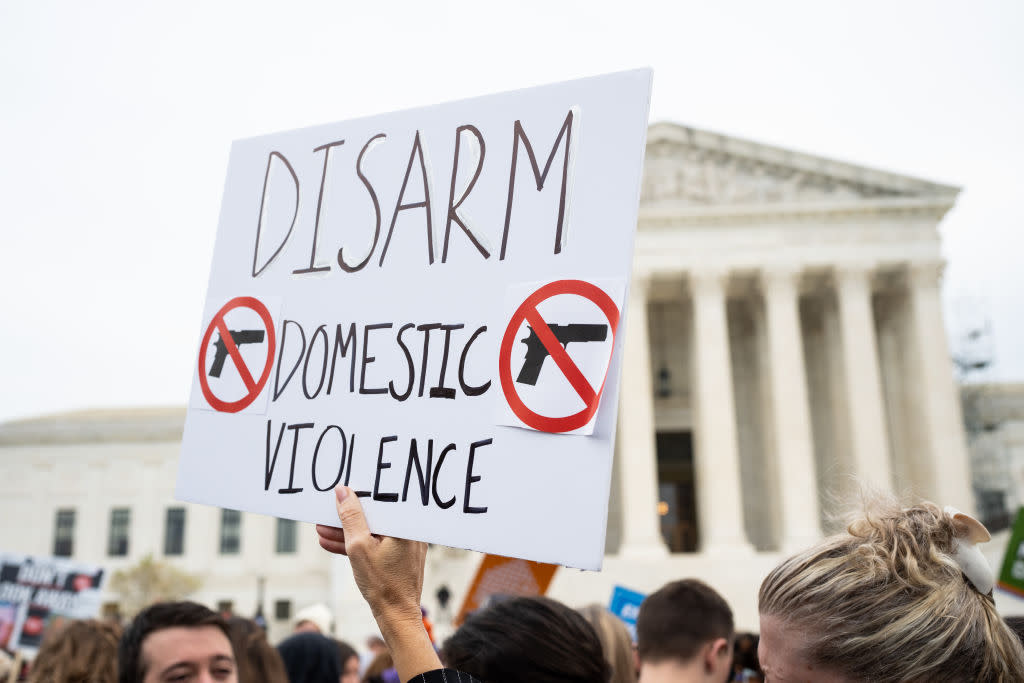The Supreme Court may make guns easier for abusers to get

The Supreme Court on Tuesday will get its first crack at deciding a controversial question: Should violent domestic abusers be allowed to possess firearms?
“A 29-year-old federal law says no,” Politico reported. The law bans any person under a domestic abuse order from possessing a gun. But a gun-friendly Supreme Court last year created a new rule for firearms restrictions: They must conform to the “text, history, and tradition” at the time the Second Amendment was added to the Constitution in the late 18th century. That may not bode well for the anti-abuser law, given that the text and traditions of American law weren’t exactly empowering to women during that era: “At first glance, looking to the 1700s or 1800s to justify keeping guns out of the hands of domestic abusers seems like a fool’s errand.”
The case stems from an incident in Texas, Ian Millhiser wrote at Vox, where Zackey Rahimi committed a series of gun crimes while under a protective order after assaulting his girlfriend. But a federal appeals court in February used his case to strike down the federal law, saying it was “unconstitutional on its face.” The problem is that Rahimi’s case was “correctly decided.” After all, it was following the Supreme Court’s new precedent. But Rahimi’s case proves that precedent “produces deeply immoral outcomes,” Millhiser argued. Will the court affirm its precedent, or back down?
Toxic in gun-loving Texas?
“Will the Supreme Court toss out a gun law meant to protect women?” Linda Greenhouse asked at The New York Times. Perhaps not. Elected Republicans — including Texas Gov. Greg Abbott and Sen. Ted Cruz — have enthusiastically signed on to previous gun rights cases before the court. This time, they’re all missing, a sign that arming domestic abusers may not be that popular. “Is the case that toxic even in gun-loving Texas?” Maybe it should be: Research shows it is “five times as likely that a female victim will be killed” if her abuser possesses a gun.
Conservatives say the Rahimi case is “about due process, not domestic violence,” Charles C.W. Cooke argued at National Review. The federal law “was nixed because it seeks to completely disarm otherwise eligible people from exercising their Second Amendment rights before those people have been convicted of anything,” The appeals court determined that the U.S. didn’t have a founding-era history of taking an individual’s guns without a conviction. “Due process is important.”
The Supreme Court can uphold the domestic violence law without disturbing its Second Amendment precedent, the ACLU’s David Cole argued at The Washington Post. There is a “long-standing historical practice of denying guns to persons individually adjudicated to pose a danger to others.” Domestic violence protective orders may not have specifically existed at the time of the founding, but they fit that description. One thing that’s clear: Rahimi is “a man who should not be permitted anywhere near a gun.“
A pledge to 'stay away from all firearms'
Rahimi, oddly enough, agrees with that sentiment. The New York Times reported that the Texas man pledged in a jailhouse letter this week to “stay away from all firearms and weapons, and to never be away from my family again.” That may take some time: Rahimi remains behind bars while he awaits the resolution of several state criminal charges.
Despite the arguments about due process, for many observers, the Supreme Court case remains fundamentally about domestic violence. “Every month, 70 women are shot and killed by an intimate partner,” law professors Ian Ayres and Fredrick Vars wrote in the Los Angeles Times. If the founders were silent on the topic, that’s their problem and not ours: “This is a modern problem,” they write. “Firearms were only rarely used to murder spouses in the late 18th century.” The legislative branch should be free to solve problems that earlier generations couldn’t properly understand. And the court “should protect domestic violence victims from guns, even if the founders didn’t.”

